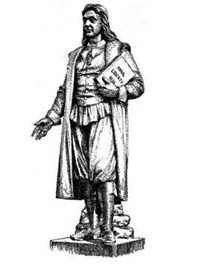Readings:
Psalm 133
1 Kings 17:1-16
1 Peter 1:13-16
Luke 9:51-62Preface of God the Father
[Common of a Prophetic Witness]
[Common of a Saint]
[For Prophetic Witness in the Church]
PRAYER (traditional language)
O God our light and salvation, who makest all free to worship thee: May we ever strive to be faithful to thy call, following the example of Roger Williams and Anne Hutchinson, that we may faithfully set our hands to the Gospel plow, confident in the truth proclaimed by thy Son Jesus Christ; who with thee and the Holy Spirit liveth and reigneth, one God, for ever and ever. Amen.
PRAYER (contemporary language)
O God our light and salvation, who makes all free to worship you: May we ever strive to be faithful to your call, following the example of Roger Williams and Anne Hutchinson, that we
may faithfully set our hands to the Gospel plow, confident in the truth proclaimed by your Son Jesus Christ; who with you and the Holy Spirit lives and reigns, one God, for ever and ever. Amen.
This commemoration appears in A Great Cloud of Witnesses.
Return to Lectionary Home Page
Webmaster: Charles Wohlers
Last updated: 5 December 2020
ROGER WILLIAMS and
ANNE HUTCHINSON
PROPHETIC WITNESSES, 1683, 1643
 Roger Williams (December 21, 1603 – April 18, 1683) was an English theologian, a notable proponent of religious toleration and the separation of church and state and an advocate for fair dealings with Native Americans. In 1644, he received a charter creating the colony of Rhode Island and Providence Plantations, named for the principal island in Narragansett Bay and the Providence settlement which provided a refuge for religious minorities. Williams is credited for originating either the first or second Baptist church established in America, which he is known to have left soon afterwards, exclaiming, "God is too large to be housed under one roof."
Roger Williams (December 21, 1603 – April 18, 1683) was an English theologian, a notable proponent of religious toleration and the separation of church and state and an advocate for fair dealings with Native Americans. In 1644, he received a charter creating the colony of Rhode Island and Providence Plantations, named for the principal island in Narragansett Bay and the Providence settlement which provided a refuge for religious minorities. Williams is credited for originating either the first or second Baptist church established in America, which he is known to have left soon afterwards, exclaiming, "God is too large to be housed under one roof."
Williams asserted that the magistrate may not punish any sort of "breach of the first table [of the Ten Commandments]," such as idolatry, Sabbath-breaking, false worship, and blasphemy, and that every individual should be free to follow his own convictions in religious matters.
The first idea—that the magistrate should not punish religious infractions—meant that the civil authority should not be the same as the ecclesiastical authority. The second idea—that people should have freedom of opinion on religious matters—he called "soul-liberty." It is one of the foundations for the religion clauses of the First Amendment to the United States Constitution. Williams' use of the phrase "wall of separation" in describing his preferred relationship between religion and other matters is credited as the first use of that phrase, and Thomas Jefferson's source in later writing of the wall of separation between church and state in a letter to the Danbury Baptist Association in 1802.
Williams's career as an author began with A Key into the Language of America (London, 1643), written during his first voyage to England. It is the first study of an Indian language in English.
The Bloody Tenent of Persecution, for Cause of Conscience soon followed (London, 1644). This is his most famous work, and was the ablest statement and defense of the principle of absolute liberty of conscience that had appeared in any language. It is in the form of a dialogue between Truth and Peace, and well illustrates the vigor of his style.
— more from Wikipedia
 Anne Hutchinson on Trial, by Edwin Austin Abbey |
Anne Hutchinson (baptized July 20, 1591 – August 20, 1643) was a pioneer settler in Massachusetts, Rhode Island and New Netherlands, and the unauthorized minister of a dissident church discussion group. Hutchinson held Bible meetings for women that soon had great appeal to men as well. Eventually, she went beyond Bible study to proclaim her own theological interpretations of sermons, some of which offended the colony leadership. A major controversy ensued, and after a trial before a jury of officials and clergy in 1638, she was banished from her colony. During the trial, Hutchinson skillfully defended herself until it was clear that there was no escape from the court’s predetermined judgment. Cornered, she addressed the court with her own judgment:
“...you have no power over my body, neither can you do me any harme, for I am in the hands of the eternall Jehovah my Saviour, I am at his appointment, the bounds of my habitation are cast in heaven, no further doe I esteeme of any mortal man than creatures in his hand, I feare none but the great Jehovah, which hath foretold me of these things, and I doe verily beleeve that he will deliver me out of our hands, therefore take heed how you proceed against me; for I know that for this you goe about to doe to me, God will ruine you and your posterity, and this whole state.”
She is a key figure in the study of the development of religious freedom in England's American colonies and the history of women in ministry. The state of Massachusetts honors her with a State House monument calling her a "courageous exponent of civil liberty and religious toleration."
— more from Wikipedia